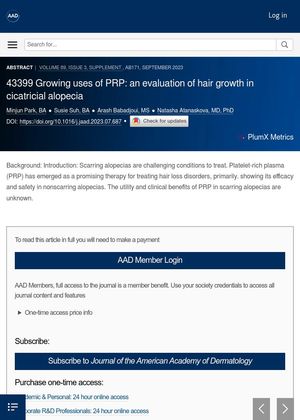Growing Uses of PRP: An Evaluation of Hair Growth in Cicatricial Alopecia
September 2023
in “
Journal of the American Academy of Dermatology
”

TLDR PRP's benefits for treating scarring hair loss are still uncertain.
This study evaluates the effectiveness of Platelet-rich plasma (PRP) in treating cicatricial (scarring) alopecia, a condition that is typically difficult to manage. While PRP has shown promise in treating nonscarring alopecias, its benefits for scarring alopecias remain unclear. The research aims to explore the potential clinical advantages and safety of PRP in this context.


